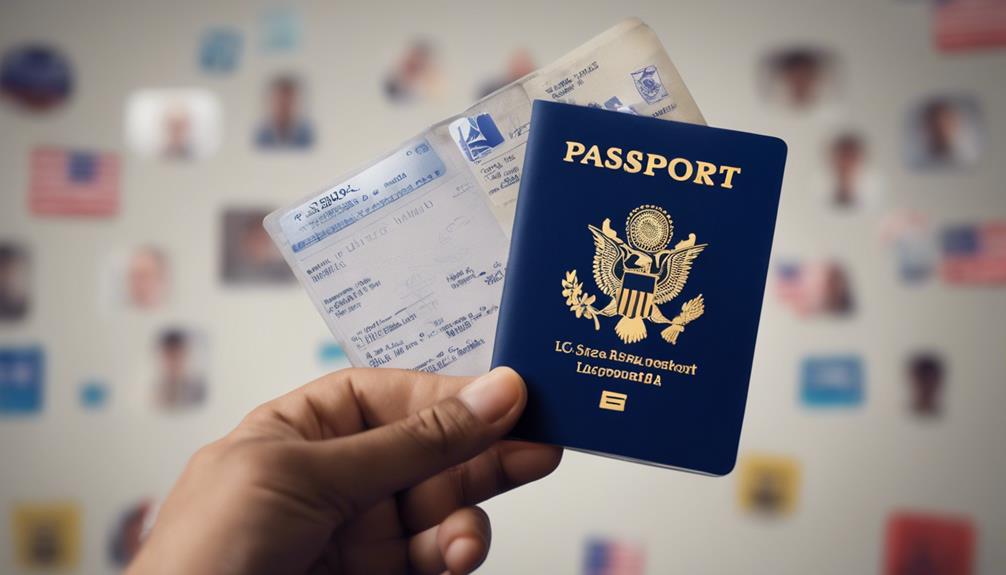Starting a business in the US as a foreigner can be a daunting but rewarding journey. Imagine launching a tech startup from Europe and expanding globally. From navigating complex legal requirements to understanding tax implications, each step is crucial.
The intricacies of visas, company structures, and state regulations might seem overwhelming, but with the right guidance, it can lead to success. Stay tuned to discover the essential tips and strategies for establishing your business in the US market.
Key Takeaways
- Choose between C corporations and limited partnerships for tax efficiency and liability protection.
- Opt for states like Delaware or Nevada to benefit from favorable business climates and tax laws.
- Understand visa options like E-2 or L-1 for non-residents establishing businesses in the US.
- Secure a physical business address in the US to comply with regulations and enhance credibility.
Choose Your Company Structure
When setting up your business in the US as a foreigner, selecting the right company structure is paramount for aligning with your business goals and ensuring tax efficiency. As a foreign entrepreneur, you have a range of options to choose from, including C corporations and limited partnerships.
C corporations are enticing for foreign nationals due to their ability to offer unlimited stock options and attract outside investors. On the other hand, limited partnerships provide limited liability protection and pass profits through to individual members for tax advantages.
In navigating the complexities of tax planning strategies, structuring salaries and expenses can help reduce corporate income and mitigate double taxation, especially for foreign-owned businesses. The choice of company structure significantly impacts your tax obligations and liability protection, making it crucial to align with your business goals, growth plans, and investor requirements.
Select a State for Registration

When choosing a state for registering your business in the US, consider factors like state tax requirements, legal structure options, and the registration process. Your choice of state can impact your business's operational flexibility and legal obligations, so it's essential to select wisely.
States like Delaware and Nevada are known for their favorable business climates, making them popular choices among foreign entrepreneurs.
State Tax Requirements
For optimal tax efficiency and strategic financial planning, selecting the right state for registration is a pivotal decision when setting up your business in the US as a foreigner.
When considering state tax requirements, keep in mind the following:
- Nevada and Wyoming: These states offer advantages such as no corporate income tax or franchise tax, making them attractive options for foreign-owned businesses.
- Delaware: Known for its favorable tax laws, including no sales tax and no tax on intangible assets like trademarks and patents, making it a popular choice for business registration.
- Financial Impact: Understanding state tax requirements is crucial as it can significantly impact the tax obligations and operational costs of your foreign-owned business in the US. Choose wisely to ensure compliance and maximize financial efficiency.
Legal Structure Options
Consider the state where you register your business in the US as a foreigner carefully, as it will impact your choice of legal structure options. C corporations, known for their unlimited stock options and appeal to external investors, are favored by many foreign nationals. States like Delaware and Nevada are popular choices for incorporation due to their business-friendly laws and resources.
Limited partnerships offer limited liability protection and allow for profits to pass through to individual members. Implementing tax planning strategies, such as managing salaries and expenses, can help lower corporate income and avoid double taxation.
Registration Process Overview
To establish your foreign-owned business in the US successfully, the selection of the state for registration plays a pivotal role in shaping your legal requirements, tax implications, and operational flexibility. When considering where to register your business, states like Delaware and Nevada stand out for foreign-owned businesses due to their favorable laws and requirements. Here's what you need to know about the registration process:
- Delaware: Offers multilingual resources, flexible corporate structures, and strong shareholder protections.
- Nevada: Known for business-friendly laws and minimal physical presence requirements.
- Legal Requirements: State selection impacts annual obligations like filing reports and paying franchise taxes, crucial for compliance and recognition.
Choosing the right state sets the foundation for a successful business venture in the US.
Registering Your Company

When setting up your business in the US as a foreigner, the initial step involves registering your company, a crucial process that lays the foundation for legal recognition and operational compliance.
Choosing to register in states like Delaware or Nevada can offer foreign-owned companies business-friendly laws and operational flexibility. The registration process typically includes selecting a unique company name, designating a registered agent, and completing a certificate of incorporation.
It's important to note that ongoing obligations such as filing reports and paying franchise taxes are standard requirements for registered companies. Proper registration is essential to ensure legal recognition and compliance with state laws, especially for foreign-owned businesses.
The state in which you register can impact the specific legal requirements, tax implications, and liability protection available to your foreign-owned company. By understanding these factors and fulfilling the necessary registration steps, you set your business on the path to success and legitimacy in the US market.
Obtain an Employer Identification Number (EIN)

Ready to solidify your business's presence in the US market? It's time to secure your Employer Identification Number (EIN), a crucial identifier mandated for various operational and legal processes.
Here's why obtaining an EIN is essential for foreign-owned businesses:
- Tax Purposes: An EIN is necessary for complying with US tax laws, filing tax returns, and ensuring your business meets its financial obligations in the country.
- Business Bank Account: To open a business bank account in the US, you'll need an EIN. This number is crucial for separating personal and business finances, essential for smooth operations.
- IRS Compliance: The IRS requires foreign-owned businesses to have an EIN for various activities, including hiring employees and conducting financial transactions. It's a vital step towards establishing your business's legitimacy in the US market.
Understanding Immigration Laws and Visas

Understanding immigration laws and visas plays a pivotal role in successfully establishing your business in the United States. As foreign citizens looking to work in the US or own a foreign-owned US business, navigating the visa options is key. Specific visas such as E-1, E-2, L-1, O-1, and EB-5 cater to non-US residents wanting to invest and work in their US ventures without requiring a green card or temporary visa.
Each visa type has distinct requirements based on factors like the amount of investment, the nature of the business, and personal qualifications. To ensure a smooth transition into the US business landscape, understanding these visa intricacies is crucial.
Working closely with immigration experts can provide the guidance needed to navigate the complexities of US immigration laws and visa processes. By staying informed and seeking the right support, you can embark on your entrepreneurial journey in the US confidently and legally.
Company Registration Process for Foreigners

Embarking on the journey of setting up your business in the US as a foreigner requires a clear understanding of the company registration process to ensure legal recognition and compliance with state laws. To successfully register your business, follow these essential steps:
- Choose a Unique Name: Select a distinct name for your company that complies with state regulations and isn't already in use by another entity.
- Select a Registered Agent: Designate a registered agent who'll receive legal documents on behalf of your business and ensure effective communication with state authorities.
- Complete a Certificate of Incorporation: File the necessary paperwork, such as the certificate of incorporation, to officially establish your business entity in the US.
Visa Options for Non-Residents

To establish your business in the US as a foreigner, explore the diverse visa options available for non-residents, each tailored to specific entrepreneurial needs and circumstances.
The E-1 visa is designed for treaty traders, facilitating international trade, while the E-2 visa caters to treaty investors seeking to develop and manage their business within the USA.
If you're considering transferring key personnel from a foreign branch to a US entity, the L-1 visa may be the ideal choice for intra-company transferees.
For individuals with extraordinary abilities or achievements in their field, the O-1 visa provides a pathway to bring exceptional skills to the US market.
Lastly, the EB-5 visa offers the opportunity for foreign investors to obtain permanent residency by making a significant investment in a US commercial enterprise.
Setting Up a Business Address

Are you aware that having a physical business address in the US is crucial for establishing your foreign-owned business?
Virtual office services can offer you a professional address without the need for a physical office.
Ensuring you have a legal address in your state of incorporation is vital for compliance and official communication.
Legal Address Requirements
When establishing your business in the US, ensuring a physical business address is essential for meeting legal requirements and facilitating official communications. Here are some key points to consider:
- Legal Requirement: A physical business address is mandatory for registering your business entity in the US.
- Operational Transparency: The business address is crucial for maintaining operational transparency and receiving important legal documents and correspondence.
- Compliance: To ensure legal compliance, it's vital to have a valid and verifiable business address that meets state-specific requirements.
Having a physical address not only fulfills legal obligations but also enhances your business's credibility and trustworthiness. Make sure your chosen address aligns with state regulations to avoid any complications in the business registration process.
Virtual Office Options
Considering the global nature of business today, exploring virtual office options can provide foreign entrepreneurs with a seamless way to establish a professional business address in the US.
Virtual offices offer foreign business owners the opportunity to have a prestigious business location without the need for physical office space. These spaces also come with essential services like mail handling and call forwarding, enhancing credibility and convenience.
Mail Forwarding Services
To establish a professional business address in the US without the need for physical office space, consider utilizing mail forwarding services as a foreign entrepreneur. Mail forwarding services provide a physical US business address for foreign-owned companies, enabling the receipt of official correspondence, packages, and legal documents for remote management.
Popular providers like VirtualPostMail and US Global Mail offer virtual mailboxes with mail scanning and forwarding options. These services help maintain privacy, professionalism, and compliance with legal requirements. By using mail forwarding services, you can enhance credibility, establish a US presence, and facilitate business operations as a non-resident entrepreneur.
Embrace this opportunity to solidify your business in the US while ensuring privacy and compliance.
Setting Up a Bank Account

Setting up a bank account for your US business as a foreigner is a crucial step towards establishing financial stability and credibility in the market. As a foreign-owned business, having a US bank account is essential for conducting financial transactions smoothly and building trust with customers and partners.
US banking institutions offer stable and cost-effective accounts tailored to the needs of foreign businesses, providing quick transfer capabilities to facilitate your operations.
Establishing a Payment Processor

Now, let's talk about establishing a payment processor for your US business venture. Understanding the payment processor requirements, selecting the right one for your needs, and seamlessly integrating it into your operations can significantly impact your success.
Ensuring smooth transactions, complying with regulations, and enhancing customer satisfaction are all crucial aspects that a reliable payment processor like Stripe can assist you with.
Payment Processor Requirements
Establishing a robust payment processor is a pivotal step in solidifying your business's financial foundation in the US market. When setting up payment processing capabilities, consider these key requirements:
- US LLC: Forming a US LLC can streamline transactions with payment processors for foreign-owned businesses.
- Reliable Solutions: Payment processors like Stripe offer trustworthy options for processing payments in the US market.
- Compliance and Integration: Understanding the requirements and integration processes of payment processors is essential for efficient financial operations.
Ensuring your business has a US-based entity can boost credibility and simplify the setup process with payment processors. By adhering to US banking regulations and establishing a solid business structure, you pave the way for seamless payment processing capabilities.
Choosing the Right Processor
When establishing your payment processor for your business in the US market, the key decision lies in selecting the right service provider that aligns with your financial needs and goals. Choosing a reliable payment processor like Stripe or PayPal is crucial for your international business.
Stripe offers competitive fees, multiple currency support, and various payment methods, while PayPal is renowned for its fraud protection and seamless e-commerce integration. Consider factors such as transaction fees, security features, and ease of integration to ensure smooth financial transactions.
Your chosen payment processor plays a vital role in enhancing customer trust and streamlining your business operations as you set up your US company, LLC, and business bank account to minimize liability risks.
Integration With Business
To enhance your business operations and build customer trust, integrate with a reliable payment processor like Stripe for seamless financial transactions. By incorporating Stripe into your business, you can benefit from:
- Secure Payment Processing: Ensure the safety of transactions for your customers and your business.
- Global Payment Support: Expand your reach by accepting various payment methods and currencies.
- Fraud Prevention Tools: Safeguard your financial transactions and optimize revenue with advanced fraud prevention features.
Integrating with Stripe won't only streamline your financial processes but also help you manage taxes efficiently as a foreign business owner in the US. Make the most of this opportunity to establish a strong financial foundation for your venture.
Conclusion
In conclusion, setting up your business in the US as a foreigner can be a challenging but rewarding journey.
By carefully choosing your company structure, registering in a favorable state, and ensuring legal compliance, you can pave the way for success.
Remember, professional guidance and thorough research are essential for navigating the complexities of US business regulations.
With determination and dedication, you can turn your entrepreneurial dreams into reality in the land of opportunity.